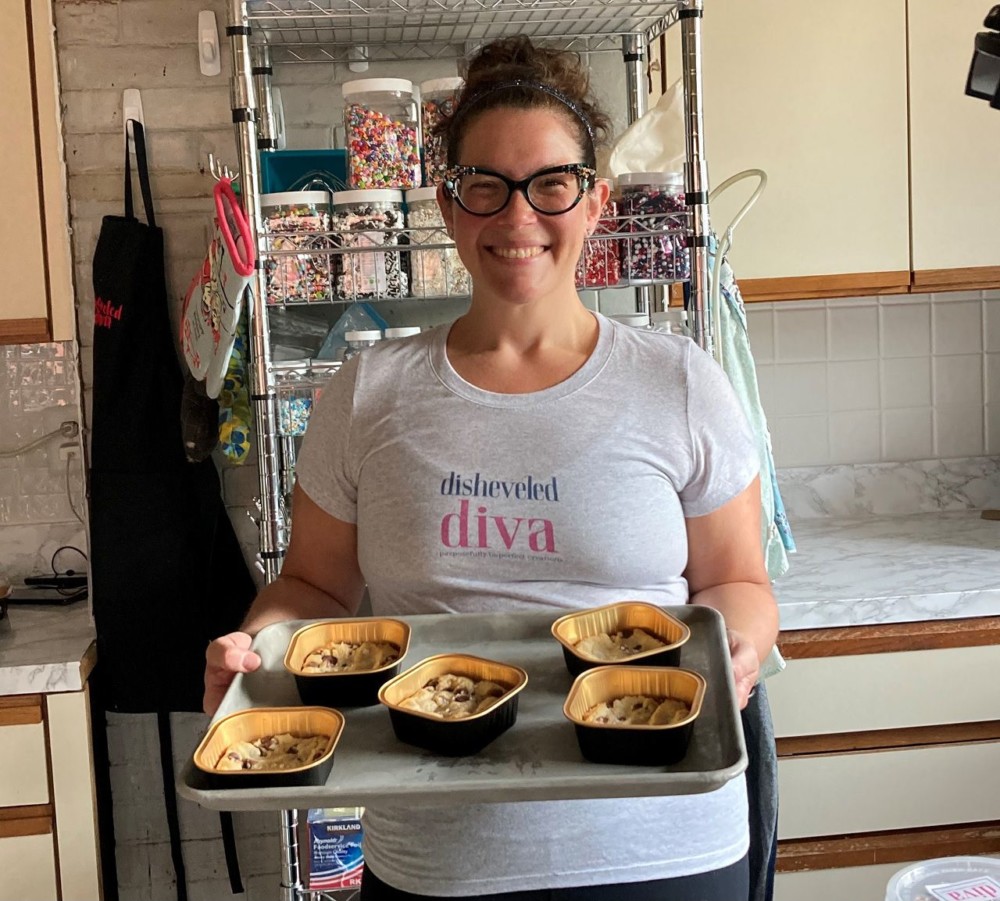Susan Dunne
Hartford Courant
WWR Article Summary (tl;dr) In Connecticut, hundreds of food entrepreneurs are getting a start in the food industry with the use of cottage permits. Cottage permits allow business owners to run micro businesses out of their homes.
Hartford
Forty hours a week, Bria Day is an insurance executive at Cigna. When she goes home each day, to her house in the West End of Hartford, she becomes the Disheveled Diva. The Diva is a chef, who bakes and sells “purposefully imperfect” custom cakes and treats: jar cakes, push pops, cookie cakes, cake bites.
Day is one of 545 people statewide getting a start in the food industry with the use of cottage permits, which allow them to run micro businesses out of their homes.
“A cottage food license is really good for people who want to dip their toe in the water safely, with low investment,” said Day, who started her business in September 2020. Cottage work is done in home kitchens, so permittees don’t have to spend a lot to rent or build out commercial kitchens.
Cottage permittees are the smallest of small businesses. Their food work is often a side gig from their regular job. Anyone whose cottage business earns more than $25,000 a year must move on to a commercial license. That is a goal for many permittees: to see if their products sell, then move upward.
Day, who donates a portion of her profits to charity, wants to move upward with Disheveled Diva, eventually becoming a consumer packaged goods company. But she’s taking her time. “I have big plans, but it does not involve retiring from corporate America,” she said. “I love my job.”
Success story
Kevin Masse isn’t retiring either. He still works for a publisher, producing a baking magazine. On the side, he runs Small State Provisions, which started as a cottage business in 2019.
“West Hartford passed cottage legislation in 2019 because there is not a lot of incubator kitchens in our area,” said Masse. “The failure rate for a new food business is extremely high and a big out-of-pocket expense. Cottage operators can build that audience following before moving onto the next phase.”
Masse is a success story. “I quickly outgrew my kitchen’s capacity and the revenue limit,” he said. In June, Masse moved into a small commercial kitchen inside West Hartford’s food truck hub GastroPark. Thursday to Sunday, he makes sourdough bread, granola, scones, cookies and chocolate babkas.
The clientele he built followed him to GastroPark. That following is especially large on Sundays, when babkas are sold. “When I open at 9 a.m. there’s a line out the door and into the parking lot,” he said.
Requirements
Kaitlyn Krasselt, of the state Department of Consumer Protection, said cottage applicants must fulfill several requirements before license approval.
“They have to get permission from their town. If they are on a well, they need a water test from within three months, or a copy of their water bill. They must complete food safety handler courses,” she said.
“Then they can fill out an application and pay the fee. They will be contacted by a member of our team, who will ask what kind of products they sell and how they will make them. They must show a sample label,” she said. “After they get a license, they have to get a business ID and register their business.”
State cottage permits, which are renewed each February, costs $50 a year, Krasselt said. She said Norwalk and Waterbury are the state’s only two municipalities that do not allow cottage businesses.
Cottage-made foods must be shelf-stable; nothing requiring refrigeration is allowed, Krasselt said. For that reason, the cottage industry is dominated by bakers.
Zoning concerns
Some municipalities also may charge fees, Krasselt said. West Hartford is one of them. Masse learned that when customers wanted to be able to pick up goods at his home rather than have them delivered.
Brittany Bermingham, a zoning enforcement officer in West Hartford, said a home occupation permit, at $135, allows a cottage business to proceed without home pickup, signs or additional employees. A special exception permit, at $430, allows a sign, up to two outside employees and on-site pickup.
“It’s about being in a residential zone and having people coming to that home,” Bermingham said.
Waterbury City Planner Bob Nerney said that city’s decision not to allow cottage businesses is rooted in zoning concerns, “the potential for people to come onto a property on a potentially unregulated basis.”
Access to child care
Stefanie Robles facilitates the Food Incubator program at reSET, a Hartford-based mentorship program for emerging small businesses. Many clients in the Food Incubator start with cottage permits. Robles said in addition to the financial advantages, cottagers can juggle child care and building their business.
“When working from home, it allows for a different level of flexibility and access to care,” Robles said. “If you only can get child care on certain hours, you can build your business around those hours.”
Stephanie Thomacos of Enfield started cottaging to make some money while staying home with her kids. Thomacos bakes macaroons and dacquoise cakes under the name Mama’s Macs. She sells at farmers markets in Ellington and Coventry and at Brignole Vineyards in East Granby.
Thomacos’ creations have become so popular that now she needs to move up to a commercial kitchen. “I can only make 1,000 cookies every weekend. I usually sell out in the first hour at both markets and then people are disappointed,” she said. “I’m sort of being forced to try to expand.”
Distributed by Tribune Content Agency, LLC.














































































































































































































































































































































































